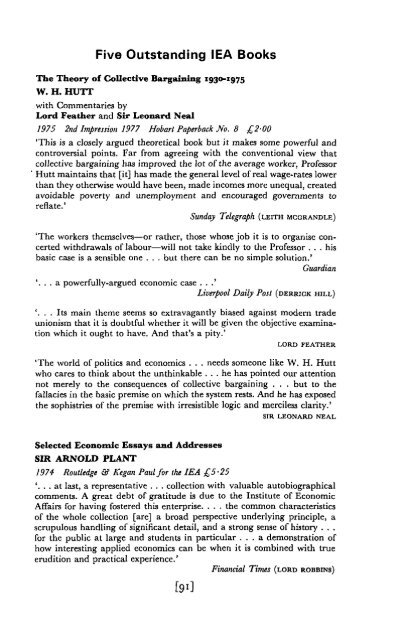THE CONSEQUENCES OF MR KEYNES.pdf - Institute of Economic ...
THE CONSEQUENCES OF MR KEYNES.pdf - Institute of Economic ...
THE CONSEQUENCES OF MR KEYNES.pdf - Institute of Economic ...
You also want an ePaper? Increase the reach of your titles
YUMPU automatically turns print PDFs into web optimized ePapers that Google loves.
Five Outstanding IEA Books<br />
The Theory <strong>of</strong> Collective Bargaining 1930-1975<br />
W. H. HUTT<br />
with Commentaries by<br />
Lord Feather and Sir Leonard Neal<br />
1975 2nd Impression 1977 Hobart Paperback No. 8 £2-00<br />
'This is a closely argued theoretical book but it makes some powerful and<br />
controversial points. Far from agreeing with the conventional view that<br />
collective bargaining has improved the lot <strong>of</strong> the average worker, Pr<strong>of</strong>essor<br />
' Hutt maintains that [it] has made the general level <strong>of</strong> real wage-rates lower<br />
than they otherwise would have been, made incomes more unequal, created<br />
avoidable poverty and unemployment and encouraged governments to<br />
reflate.'<br />
Sunday Telegraph (LEITH MCGRANDLE)<br />
'The workers themselves—or rather, those whose job it is to organise concerted<br />
withdrawals <strong>of</strong> labour—will not take kindly to the Pr<strong>of</strong>essor ... his<br />
basic case is a sensible one . . . but there can be no simple solution.'<br />
Guardian<br />
'. . . a powerfully-argued economic case . . .'<br />
Liverpool Daily Post (DERRICK HILL)<br />
'. . . Its main theme seems so extravagantly biased against modern trade<br />
unionism that it is doubtful whether it will be given the objective examination<br />
which it ought to have. And that's a pity.'<br />
LORD FEA<strong>THE</strong>R<br />
'The world <strong>of</strong> politics and economics . . . needs someone like W. H. Hutt<br />
who cares to think about the unthinkable ... he has pointed our attention<br />
not merely to the consequences <strong>of</strong> collective bargaining . . . but to the<br />
fallacies in the basic premise on which the system rests. And he has exposed<br />
the sophistries <strong>of</strong> the premise with irresistible logic and merciless clarity.'<br />
SIR LEONARD NEAL<br />
Selected <strong>Economic</strong> Essays and Addresses<br />
SIR ARNOLD PLANT<br />
1974 Routledge & Kegan Paul for the IEA £5-25<br />
'. . . at last, a representative . . . collection with valuable autobiographical<br />
comments. A great debt <strong>of</strong> gratitude is due to the <strong>Institute</strong> <strong>of</strong> <strong>Economic</strong><br />
Affairs for having fostered this enterprise. . . . the common characteristics<br />
<strong>of</strong> the whole collection [are] a broad perspective underlying principle, a<br />
scrupulous handling <strong>of</strong> significant detail, and a strong sense <strong>of</strong> history . . .<br />
for the public at large and students in particular ... a demonstration <strong>of</strong><br />
how interesting applied economics can be when it is combined with true<br />
erudition and practical experience.'<br />
Financial Times (LORD ROBBINS)<br />
[91]












